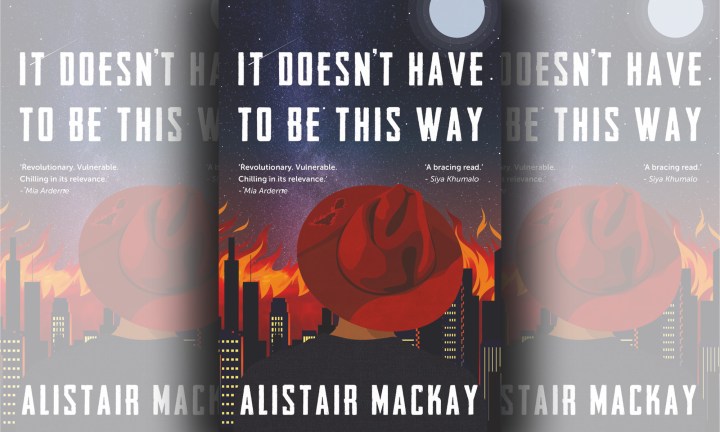BOOK REVIEW
‘It Doesn’t Have to Be This Way’ — a must-read fiction about the very real climate crisis

Alistair Mackay’s ‘It Doesn’t Have to Be This Way’ is a captivating read about love and connection, while also being a painful, heart-wrenching call to action on behalf of our planet.
Set in a Cape Town that has been devastated by rising sea levels, extreme weather events and drought, It Doesn’t Have to Be This Way by Alistair Mackay is an arresting page-turner that documents the planet’s descent into a full-blown climate crisis.
Mackay’s choice to set this novel in Cape Town may hit a bit too close to home for South African readers, with the city’s lush landscape now bone dry, streets underwater and makeshift homes scrambling up Table Mountain to escape the rising sea. Separated into two time periods, one in present-day Cape Town, the other in a not-so-distant future, the setting makes Mackay’s message about climate change more tangible and relatable, forcing the reader to grapple with what happens when what they know and love is on fire.
Mackay’s work is fiction and yet the discussions around climate change, artificial intelligence, virtual reality, queerness and religion are all real and ubiquitous today. This pulls the reader into Mackay’s world as he unsettles many of the anxieties that people may share today about the world and the environment.
The novel is also a love story, following three queer friends, Luthando, Viwe and Malcolm as they face the impending climate disaster, and detailing the individual actions they take or don’t take. In the future, after the Change, the fourth voice of Milo is introduced, as he grows up in a world that the adults who came before him had neglected.
“There aren’t any good days left. Dad said we used them all up when he was a kid,” Milo laments.
‘How many people ever look up?’
While Milo’s childhood is lived in poverty, some have managed to escape to protected areas and alternate realities. Underneath a glass dome covering Signal Hill and Lion’s Head lies the Citadel, where affluent residents live safely tucked away from the pollution and violence outside, with access to virtual reality technology that places them in new worlds of their choosing. When activated, the virtual reality programmes turn their users’ eyes “silvery opaque” — they are zombies who choose to live in worlds that do not exist.
At one point, as Malcolm commutes to work in the Citadel, he finds himself alone. He is surrounded by other commuters, yet they are interacting on another plane of existence.
“No one talks. Do Not Disturb is activated in most passengers — little pinpricks of red light glow in their earlobes — and their eyes are silvery opaque.”
The more time one spends with these programmes activated, the more difficult it is to spend time outside of them, and users spend their lives playing virtual games, interacting on social media and curating their world through avatars and code.
“Sand and debris billow off Table Mountain in thick arcs. The sky is bone-white and cloudless. Black smoke rises from various fires in the slums that stretch up into the crags and cover the tabletop like mould. It surprises Malcolm, every time he looks up with his corneas set to transparent, that the Citadel hasn’t yet projected rainforests or historical footage onto the great glass dome that covers them. Perhaps it isn’t worth the expense. How many people ever look up?”
In the present day, as Luthando, Viwe and Malcolm face the looming uncertainty of the future, Mackay has tied them together through this shared connection to the soil of Cape Town. Through shared tents, bottles of wine and handwritten letters, the three push back against the modern-day desire to “connect” through technology and isolate themselves in the virtual world. Though they all go through their own unique experiences, Mackay has written relationships and human connection as precious things to be treasured; social necessities that go deeper than likes and hashtags.
A love letter to planet Earth
The novel reads as a love letter to planet Earth as Luthando, Viwe and Malcolm find connection in their shared passion for nature and the environment. Yet is also a stark caution of what is to come if humans do not heed the warning signs.
“Patterns repeat themselves throughout the universe at different scales. A forest on a mossy tree. A supernova in the iris of an eye.
“To the gods, we’re tiny dust mites on a blue marble in space. To the infinitesimal ecosystems we can barely see, we’re the bumbling giants. We’re the gods, and we haven’t yet learned how to control our destructive powers.”
It Doesn’t Have to Be This Way is an exquisitely crafted story of love and loss, identity and humanity, as Mackay weaves together the complexity of being a human in the world today. It is a novel that is full of heart and hope, but is gut-wrenching in its portrayal of the world that humans are losing to climate change. DM/ML
In case you missed it, also read What is ‘adulting’? Jen Thorpe’s new book teaches you how to do it
What is ‘adulting’? Jen Thorpe’s new book teaches you how to do it
Visit Daily Maverick’s home page for more news, analysis and investigations

















 Become an Insider
Become an Insider
Comments - Please login in order to comment.